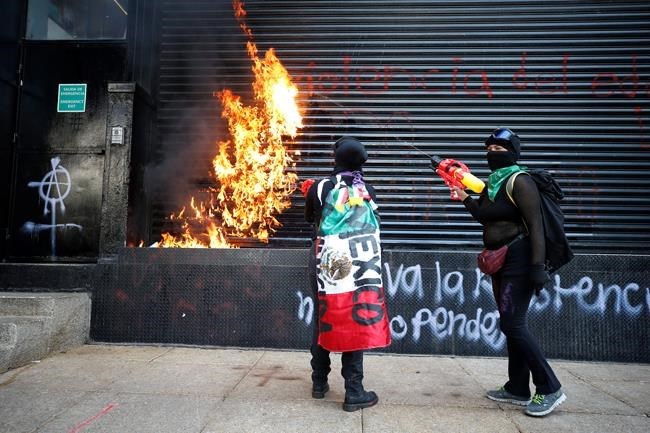
Demonstrators set fire to the entrance of a building during a march for International Women's Day in Mexico City, Sunday, March 8, 2020. Protests against gender violence in Mexico have intensified in recent years amid an increase in killings of women and girls.(AP Photo/Rebecca Blackwell)
Republished March 08, 2020 - 7:19 PM
Original Publication Date March 08, 2020 - 11:56 AM
MEXICO CITY - Adriana. Dulce. Paola. Nayeli. Ingrid. Maria — lots of Marias. These are just some of the names of the thousands of women killed each year in Mexico, often by their intimate partners.
Tens of thousands of women wearing purple poured into the streets of Mexico City on Sunday to protest rampant and brutal gender violence in the country on International Women's Day.
Some spray painted messages like “Mexico kills women” onto monuments, smashed windows and set fires — often to cheers from the multitude. Most marched peacefully in groups organized by universities, non-profits or with friends.
Government data shows that 3,825 women in Mexico met violent deaths last year, 7% more than in 2018. That works out to an average of more than 10 women slain each day, making it one of the most dangerous countries in the world for females. Thousands more have gone missing without a trace in recent years.
Girls and women throughout the country will follow up with a strike on Monday.
“That means no going out, not even for a coffee,” said Natalia Olalde, an 18-year-old university student who planned to observe the strike.
Murders of women in Mexico are often accompanied by sexual violence and stunning brutality. Some women are burned. Some are mutilated. Authorities seem incapable of preventing or properly investigating the crimes, very few of which result in convictions.
Protesters tinted red the water of the fountain to the Roman goddess Diana in Mexico City — to symbolize the blood of victims — and also the water of a fountain to the Roman goddess of wisdom, Minerva, in Guadalajara.
Activists then carpeted Mexico City's central Zocalo square with victims' names in white block letters. The names came from public records of deaths that appear to fall into the category of femicide, meaning those women's killings showed marks of hatred for the female gender.
“We decided it was a moment to put them into numbers — all those women who are missing, who they've taken from us,” said Sofia De Robina, a lawyer with the Miguel Agustin Pro Human Rights Center.
The idea was to place names on the asphalt as a memorial, but also to give them a voice in the day's protest.
The protest amassed participation from across Mexican society, expanding well beyond the academics and activists that typically participate.
Housewives, students and even mothers with small children on their shoulders took to the streets of Mexico City wearing purple shirts, bandannas and hats. Purple is a colour often used to represent gender equality.
They carried signs saying, “We are the heart of those that no longer beat” and “I’m marching today so that I don’t die tomorrow.”
María de la Luz Estrada, co-ordinator of the National Citizen’s Observatory on Femicide, said more Mexican women have taken to the streets in recent years because the assaults and killings are “increasingly more alarming.”
Estrada led a contingent of mothers whose daughters have been killed. Over time, the mothers have become activists who share their daughters' stories in the hopes that others can avoid the same tragic end. Several say officials initially ruled their daughters' deaths suicides, demonstrating little desire to investigate.
“Receiving the news that your daughter has been found without life is like being smashed against the wall,” recounted Patricia Becerril, whose daughter Zyanya Estefanía was found dead in 2018 while studying to be a doctor in the central state of Puebla.
Seeing the mothers advance, the crowd of protesters chanted: “You're not alone!”
Ana Paula Santos raised her fist in the air as the mothers passed, while her eyes filled with tears.
“I don’t want to be the next one, and I don’t want my mother to be the next one,” said the 21-year-old public university student.
Enriqueta Diego, a mother of two girls and a boy from the central city of Puebla, said she joined the march in the hopes of improving security for all the women in the country.
“They’re killing us with total impunity,” said the 52-year-old.
First-time protesters wrote names, contact phone numbers and even blood types on their arms as a security measure. Threats had circulated prior to the event that protesters might be attacked with acid.
Bands of masked women smashed windows, lit fires and spray painted messages. At least one onlooker suffered first degree burns after a fire bomb ricocheted into the crowd.
Afterward women taped their protest cards onto the fences around the country's Senate.
___
Associated Press journalist Rebecca Blackwell contributed to this report.
News from © The Associated Press, 2020